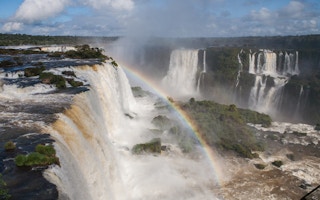Brace for a new Brazil - a much greener one, too.
No sooner had Luiz Inácio Lula da Silva Lula won the presidency on Sunday than he signaled a U-turn by Brazil on climate change, vowing to save the world’s biggest rain forest after years of decimation.
“Let’s fight for zero deforestation in the Amazon,” Lula told a cheering crowd just 17 minutes into his victory speech.
“We will resume monitoring and surveillance of the Amazon, and fight any and all illegal activity,” said Lula, promising “sustainable development of communities living in the Amazon”.
Deforestation surged under President Jair Bolsonaro, who lost by some 2 million votes in an electorate of about 124 million.
“
An arm wrestle may happen at first, but I think the strength of the federal government will prevail.
Beto Veríssimo, co-founder, Imazon
Critics accused Bolsonaro of promoting illegal mining and logging in the Amazon, weakening environmental agencies and ignoring indigenous concerns over a fast-growing land grab.
With Bolsonaro on the way out, what do experts expect from President Lula redux - he ran Brazil from 2003-2010 - and what challenges will he face?
What was the first reaction to Lula’s victory?
An immediate effect of Lula’s win is the rebranding of Brazil as climate-friendly, said Raul do Valle, political advocacy coordinator for WWF-Brasil, a green non-profit.
Climate change figured large in a slew of congratulatory calls from foreign leaders, US President Joe Biden among them.
Hope of concrete change came from Norway, which said it was ready to discuss resuming donations to an Amazon preservation fund that was frozen in 2019, when Bolsonaro took office.
Experts say foreign funds will be vital if cash-strapped Brazil is to green its ways.
“The government will need the money from funds like these to fight deforestation and to kick-start a green economy,” said do Valle. “This first year will be about tidying up the house.”
Lula’s Workers’ Party (PT) has announced he will attend COP27 - the United Nations climate summit in Egypt, next week.
Lula will use the event to ask rich countries to provide financing to poor countries to tackle climate change, Marina Silva, Lula’s former environment minister, told Reuters.
What to expect from the new Brazilian government
Many of Bolsonaro’s anti-environmental measures came via decree and can be undone with the stroke of a pen, experts said.
Lula also wants a minister for indigenous affairs in his cabinet, to be run by an indigenous leader - a first for Brazil.
This would win praise abroad, where indigenous people are recognized as protectors of the forests, said Beto Mesquita, a director at BVRio, a Rio-based environmental non-profit.
Lula will also resume so-called recognition of indigenous territories, said Nilto Tatto, a congressman for PT, ending a freeze by Bolsonaro despite many hundreds of applications.
“Things will return to normal,” said Tatto.
Lula is also expected to try a show of strength, launching operations to fight illegal deforestation, and expel illegal loggers and miners from indigenous lands rife with conflict.
Will deforestation in the Amazon decrease?
“I’m not sure we will have good numbers on deforestation next year,” said Marcio Astrini of the Climate Observatory, an environmental watchdog, predicting losses would stay high.
Lula will appoint new heads to the bodies charged with protecting the environment - a boost after they were weakened by Bolsonaro - but experts said rebuilding them would take time.
Is a Brazilian “Green New Deal” possible?
A PT document, “Rebuild and Transform Brazil”, made reference to a “Green New Deal” to shift Brazil into a low- carbon economy, generating jobs on the way.
Restoring degraded forests may generate some jobs; other green industries need creating from scratch, possibly through new cooperatives to boost jobs and income.
Green jobs will be vital in Amazonian areas where illegal logging and gold mining run the economy, experts said.
As well as fighting these activities, social programs will be needed to help wean reliant workers and their families off the profits, said Carolina Genin, director of Climate at the World Resources Institute Brasil, a research institute.
What resistance will Lula face?
Six of the nine Amazon states are run by governors that support Bolsonaro and his Amazon strategy.
But most of those states are dependent on federal money, which could mean a political realignment once Lula takes over.
“An arm wrestle may happen at first, but I think the strength of the federal government will prevail,” said Beto Veríssimo, co-founder of Imazon, an Amazon-based non-profit.
In Congress, Lula will face resistance from a pro-agribusiness caucus. He will have to stop several bills that would open up the Amazon to mining and cattle ranching.
Candidates supported by Bolsonaro did a lot better than expected in this year’s congressional election, experts said, even as Bolsonaro’s own star waned.
This story was published with permission from Thomson Reuters Foundation, the charitable arm of Thomson Reuters, that covers humanitarian news, climate change, resilience, women’s rights, trafficking and property rights. Visit https://www.context.news/.










